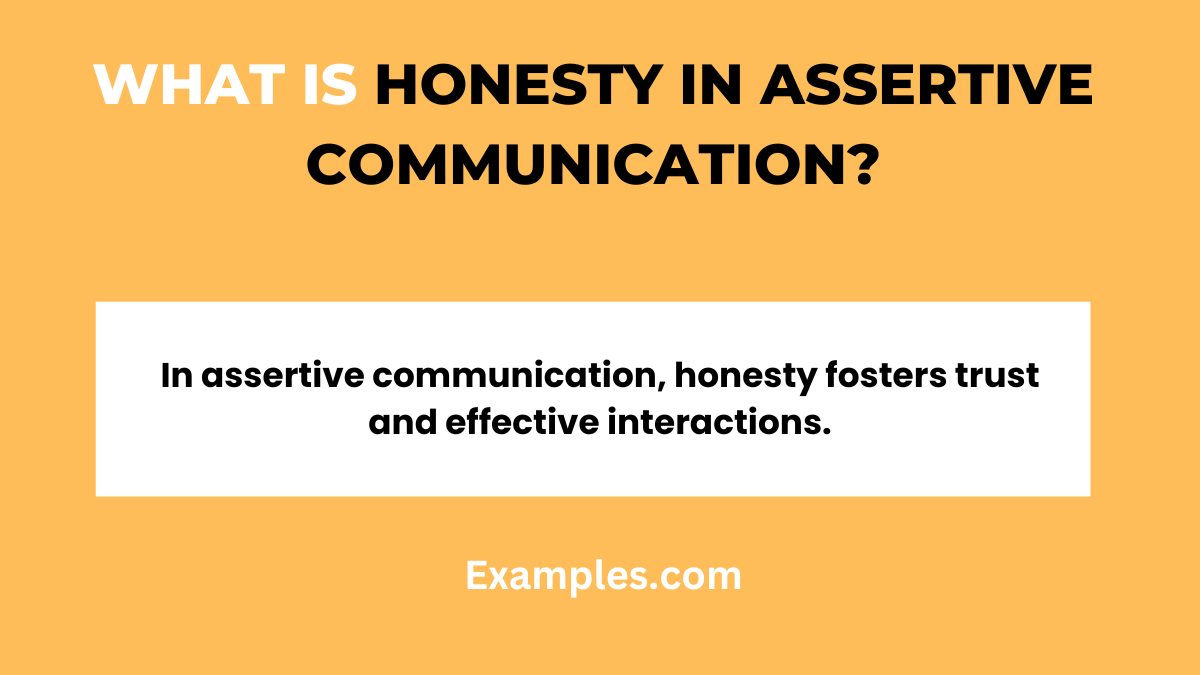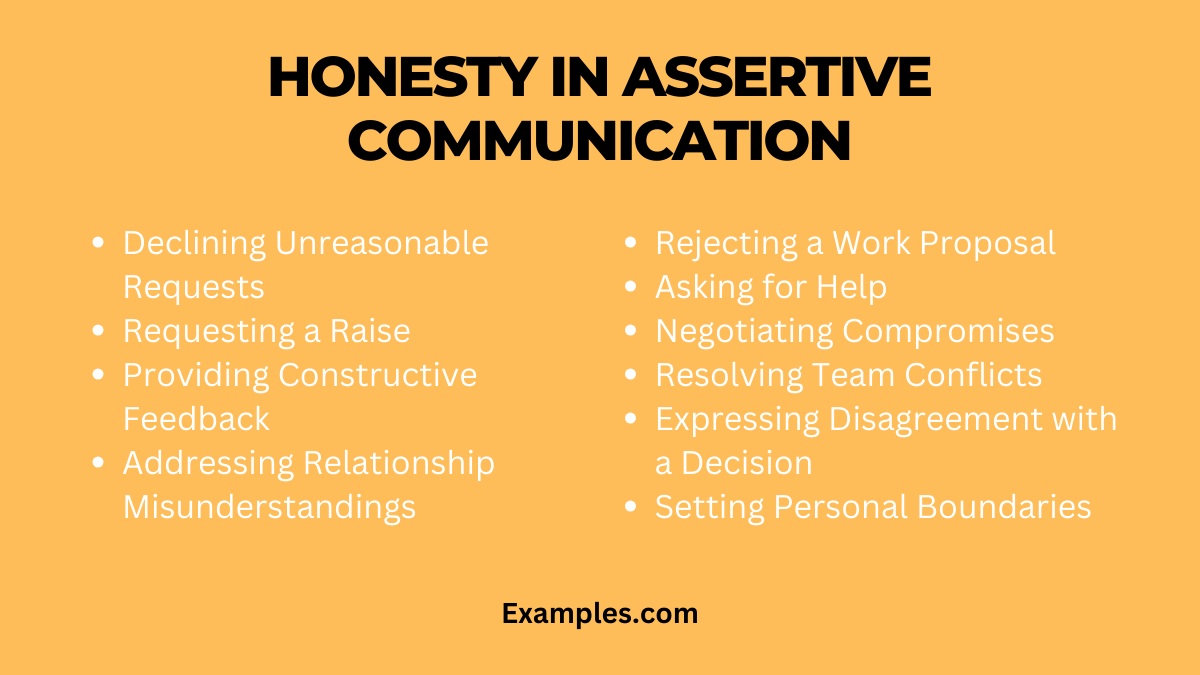9+ Honesty in Assertive Communication Examples
Assertive communication, rooted in honesty, is essential for effective and respectful interactions. This guide offers a deep dive into how to communicate assertively while maintaining honesty. Learn the art of expressing yourself clearly and respectfully, using I Statements and maintaining a Respectful Tone. Through practical examples and tips, you’ll discover how to navigate various scenarios with confidence and integrity. This guide is a comprehensive resource for enhancing your Assertive Communication Skills, crucial for both personal and professional success.
What is Honesty in Assertive Communication?

Honesty in assertive communication is about expressing your thoughts and feelings openly and directly while respecting others. It involves being truthful and clear in your communication, avoiding manipulation or passive-aggressiveness. This approach fosters trust and mutual respect, making it a cornerstone of effective interpersonal interactions.
What is the Best Example of Honesty in Assertive Communication?

A prime example of honesty in assertive communication is when a manager provides clear and constructive feedback to an employee. Instead of using vague or indirect language, the manager directly addresses areas for improvement while also acknowledging the employee’s strengths. This approach not only promotes clarity and growth but also maintains a respectful and supportive work environment.
10 Honesty in Assertive Communication Examples

Embracing honesty in assertive communication is vital for building trust and respect in any relationship, whether personal or professional. This guide presents 15 distinct examples, illustrating how to effectively blend honesty with assertiveness. From the workplace to personal interactions, these examples showcase the power of combining clear expression and empathetic listening with straightforwardness. Learn how to articulate your needs and opinions respectfully, while also valuing the perspectives of others. These examples serve as practical templates for anyone looking to enhance their Assertive Communication Skills.
- Declining an Unreasonable Request: Here, honesty about your capabilities is communicated assertively, without offending the requester.“I appreciate your confidence in me, but I cannot commit to this deadline without compromising the quality of the work.”
- Asking for a Raise: This statement directly and respectfully conveys your worth and your request.“I believe my recent contributions to the project demonstrate my value to the team. I’d like to discuss a salary adjustment based on these achievements.”
- Providing Constructive Feedback:Offering specific, actionable feedback showcases honest yet positive communication. “Your report was well-researched, but I suggest more focus on the financial analysis to enhance its impact.”
- Addressing a Misunderstanding in a Relationship: Assertiveness is shown in addressing feelings directly while also seeking to understand the other person.“When you said that, I felt overlooked. Can we talk about it so I can understand your perspective better?”
- Setting Personal Boundaries: Clearly stating personal needs and boundaries reflects honesty and respect for the relationship.“I value our friendship, but I need some space to focus on my personal goals right now.”
- Rejecting a Proposal at Work: Respectfully declining while keeping the door open for future suggestions.“I appreciate your innovative idea, but it may not align with our current strategic goals. Let’s explore other options.”
- Asking for Help: Openly admitting the need for help and valuing others’ skills demonstrates assertive yet humble communication“.I’m struggling with this task and would value your expertise. Can you assist me?”
- Negotiating Compromises: This shows a willingness to find a solution that respects both sides’ interests.“I understand your point, but let’s find a middle ground that benefits both parties.”
- Resolving Conflicts in a Team Setting: Encouraging open dialogue and collective decision-making in a respectful manner.“I see there are differing opinions. Let’s discuss this openly to reach a consensus.”
- Expressing Disagreement with a Decision: This approach allows for sharing differing views in a non-confrontational way.“While I respect your decision, I have concerns about its impact. May I share my perspective?”
Importance of Honesty in Assertive Communication
Honesty in assertive communication is a pivotal aspect of effective and ethical interaction. This guide highlights the significance of integrating honesty with assertiveness, outlining its impact on various facets of communication. From building trust to facilitating conflict resolution, the blend of honesty and assertiveness is essential for clear, respectful, and productive communication. The examples provided under each point illustrate practical applications, offering insight into how honesty can enhance your assertive communication in real-life scenarios.
1. Builds Trust
Honesty in assertive communication establishes a foundation of trust. When individuals communicate openly and truthfully, it fosters a sense of reliability and integrity. This trust is crucial for healthy personal and professional relationships.
Example: A manager openly discussing team performance issues, offering truthful yet constructive feedback.
2. Enhances Credibility
Being honest in your communication enhances your credibility. People are more likely to take you seriously and value your opinions when they know you speak truthfully, reinforcing the effectiveness of your Assertive Communication Skills.
Example: An employee honestly expressing their workload capacity to their supervisor, thereby gaining respect for their integrity.
3. Promotes Clear Understanding
Honesty ensures that your message is conveyed clearly and accurately. It eliminates the risk of misunderstandings that can occur with ambiguous or deceitful communication, making Direct Communication more effective.
Example: A doctor explaining a diagnosis clearly and honestly to a patient, ensuring they understand their condition and treatment options.
4. Encourages Openness
An honest approach encourages others to be open in return. This reciprocal openness leads to more meaningful and productive conversations, especially in Conflict Resolution in Assertive Communication.
Example: A colleague sharing genuine concerns about a project, encouraging others to voice their true opinions.
5. Facilitates Conflict Resolution
Honesty is key in resolving conflicts. By expressing your true feelings and perspectives assertively, you pave the way for genuine resolution and mutual understanding, vital in Assertive Communication Scenarios.
Example: Partners discussing relationship issues openly, each expressing their feelings and viewpoints honestly.
6. Strengthens Relationships
Honest communication strengthens interpersonal relationships. It builds a deeper connection and mutual respect, which are essential components in maintaining long-term relationships, both in personal and professional contexts.
Example: Friends discussing a misunderstanding openly, leading to a deeper and more understanding relationship.
7. Aids Personal Growth
Engaging in honest self-reflection and communication promotes personal growth. It helps in recognizing and addressing one’s own areas for improvement, especially when paired with Constructive Feedback in Assertive Communication.
Example: An individual assessing their own strengths and weaknesses honestly, leading to targeted personal growth.
8. Reduces Stress and Anxiety
Honesty reduces the stress and anxiety associated with hiding the truth or manipulating information. This emotional relief is crucial for maintaining mental well-being and effective Emotional Regulation in Assertive Communication.
Example: A student openly discussing their academic challenges with a teacher, rather than hiding them.
9. Improves Decision Making
Honesty in communication plays a critical role in decision-making processes. Clear and truthful communication allows for informed and well-considered decisions, essential in Setting Boundaries in Assertive Communication.
Example: A business leader considering honest feedback from team members when making strategic decisions.
10. Encourages Ethical Behavior
Promoting honesty in communication encourages ethical behavior in all aspects of life. It sets a standard for integrity and morality, which is particularly important in leadership and management roles within Assertive Communication at the Workplace.
Example: A company executive consistently communicating truthfully with stakeholders, setting an ethical tone at the top.
In conclusion, mastering assertive communication is a transformative journey that not only enhances personal interactions but also elevates professional relationships. By embracing the characteristics of assertive communication, individuals can navigate various situations with confidence and respect, ensuring their voice is heard while acknowledging the perspectives of others. This balanced approach is key to building and maintaining healthy, productive relationships in all spheres of life.
For further exploration into the nuances of assertive communication, the American Psychological Association (APA) offers valuable insights. Additionally, Harvard University’s Program on Negotiation at Harvard Law School presents an in-depth look at assertive communication in conflict resolution. Their resource i.e science of honesty, is an excellent guide for those seeking to apply assertive communication in challenging scenarios. These resources complement the knowledge gained here, offering a broader understanding and application of assertive communication in everyday life.



